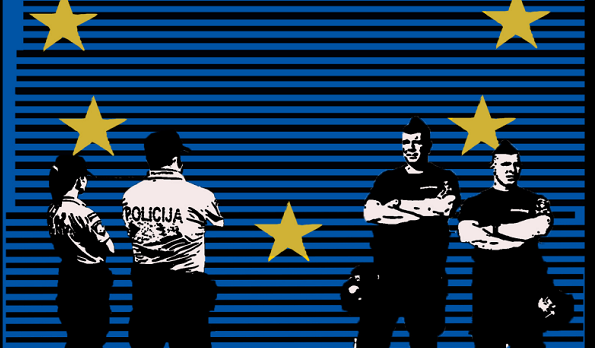In the latest issue of its Illegal Pushbacks and Border Violence Report, the watchdog network Border Violence Monitoring analyses 40 cases of pushbacks along the Balkan Route and Greece that affected 1,548 people on the move in September 2020. According to the report, the collected testimonies are extremely alarming and demonstrate how the existing EU border regime is underpinned by horrendous abuse.
A number of pushbacks were documented in Tovarnik at the Croatian border with Bosnia and Herzegovina, which affected people intercepted across Croatia and through chain pushbacks people intercepted in Slovenian and Italian territories. The patterns of physical mistreatment during these operations by Croatian border police suggests a systematic use of violence. Recurrent abuse involved being beaten, forced to undress, and having belongings stolen or destroyed. Both men, women, and children were affected.
The report highlights the widespread use of weapons during violent pushback operations across the region including assault rifles, pistols, batons and tasers. Further, the use of more improvised and non-standard weapons emphasises the demonstrative nature of the abuse that exceeds regular policing practices. During an earlier reported case, Romanian police used an improvised whip consisting of an cable attached to a wooden baton to lash a group of Syrian nationals. And also the use of tree branches in beatings is frequently recorded.
Chain pushbacks across multiple countries continued to take place during the reporting period. In an incident from mid-September, a group of five was intercepted in the Austrian village of Laafeld and handed over to Slovenian police. Subsequently the group was further pushed back to Croatia and finally beyond EU borders to Bosnia and Herzegovina. A testimony report suggests that there was at least one more case of a chain pushback from Austria to Bosnia and Herzegovina in September.
In Greece, BVMN covered the maritime pushback of 59 people in two separate incidents in September. Commonalities across these incidents included efforts by the Hellenic Coast Guard to damage dinghies by cutting holes in the inflated sections, taking the fuel, or creating large waves in order to push dinghies back into Turkish waters. In one case, the transit group was taken aboard the coast guard vessel and then put into a liferaft. The testimonies correspond with incidences reported by organisations such as Human Rights Watch and suggest a significant increase in maritime pushbacks in the Aegean. Despite mounting evidence, both Greek Prime Minister Kyriakos Mitsotakis and Minister for Asylum and Migration, Notis Mitarachi, have categorically denied Greece’s involvement in maritime pushbacks.
The trend of outsourcing the ferrying during pushbacks across the Evros river to members of the transit community continued in the reporting period. 14 pushbacks from Greece to Turkey across the Evros were reported in September, the majority involved the described practice. Rumours have circulated among the transit community that drivers are paid or promised preferential treatment during their asylum application by Greek officials.
As a reaction to recent reports compiled by ECRE member the Danish Refugee Council, on the extreme abuse by Croatian border guards, EU Commissioner for Home Affairs Ylva Johansson stated she was: “planning a thorough discussion with the Croatian authorities on these and other reports of fundamental rights violations”.
For further information:
- ECRE, Balkan Route: Thousands Stuck at External EU Borders Face Destitution and Violence from Locals and Those Keeping the Gate Closed, 2 October 2020
- ECRE, Balkans: Continued Pushbacks and the Formation of a Paramilitary Practice at the Southern Borders, 25 September 2020
- ECRE, Things are Heating up along the Balkan Route, 18. September 2020
- ECRE, Balkans: New Report Details Illegal Pushbacks and Border Violence, 28 August 2020
- ECRE, Slovenia Plans New Barriers at the Border while Pushbacks and Violence Continue Across the Balkans, 17 April 2020
- ECRE, Balkans: New Protests Along the EU Borders, 21 February 2020
- ECRE, Croatia: New Report on Torture of Asylum Seekers by Authorities, 31 January 2020
- ECRE, Shots Fired, Arrests and Violent Push Back Reported at the Serbian Hungarian Border, 31 January 2020
- ECRE, Spain: 55 Jump Fence to Melilla, 10 April 2020
- ECRE, D and N.T v Spain: Return to Morocco Did Not Breach Convention, 14 February 2020
- EDAL, and N.T. v. Spain: do hot returns require cold decision-making?, 28 February 2020
Photo: Border Violence Monitoring Network
This article appeared in the ECRE Weekly Bulletin. You can subscribe to the Weekly Bulletin here.

